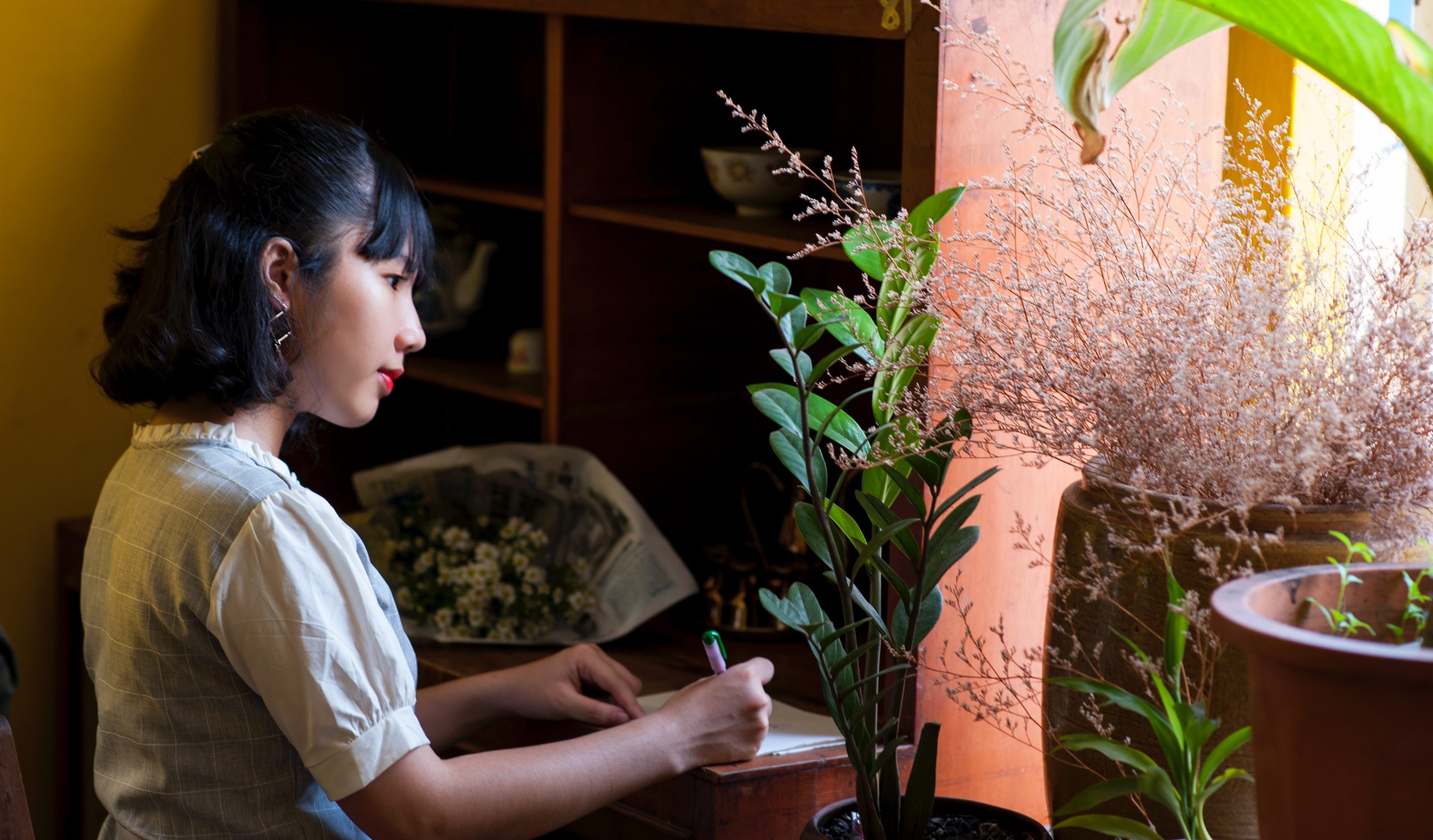As a tea lover, you probably enjoy drinking a hot cup of tea as a way to take a much-needed break. Tea is a great way to start the morning off right or to gradually wind down at the end of the day. Even without trying to make it special, many people find preparing and drinking a cup of tea to be a calming ritual. In this article, we’ll talk about how to enhance your relaxing tea break even further.
Links between tea and meditation
Tea has a long history of being used to aid meditation. Ever since being introduced to Japan by way of China around 1100 A.D., Zen monks would use tea to stay alert and awake during their meditations. Over time, tea and meditation have become deeply entwined.
The famous Vietnamese monk Thich Nhat Hanh once said, “Tea is an act complete in its simplicity. When I drink tea, there is only me and the tea. The rest of the world dissolves. There are no worries about the future. No dwelling on past mistakes. Tea is simple: loose-leaf tea, hot pure water, a cup…there is only the tea, and me, converging.”
When we consider his words, it does make us think about how naturally tea pairs with mindfulness. This is because, in its essence, tea meditation is a mind-body practice.
Mind-body practices are a group of activities which stimulate the parasympathetic nervous system, in turn activating the body’s natural relaxation response. These calming activities include yoga, acupuncture and tai chi.
Tea stimulates the body, while meditation activates the mind. Drinking tea and mindfulness interplay well together: the tea offers a physical tool that affects the nervous system and aids the mindful practice.
Tea meditation for the modern world
Japanese tea ceremonies, also called sadō or chadō, are one of the most famed types of tea meditation. These special rituals are renowned for their detailed and perfectly coordinated actions. They involve dedicated rooms, traditional kimono, and equipment such as floor mats and scrolls hanging from the walls. It’s undeniably a beautiful ceremony and something most tea lovers ache to experience some day.
However, putting together such an ornate process is often too time-consuming and cost-prohibitive for the average person in the Western world. Tea meditation, sometimes called mindful tea drinking, is gaining popularity as it is a more accessible way to enjoy the calming benefits of a traditional Japanese tea ceremony. Tea meditation is a great way to reflect, stay present in the moment, and ease the difficulties of deeper meditation. All you need is your regular tea drinking equipment and a quiet environment.
Benefits of meditation while drinking tea
- Mindfulness, a type of meditation in which you focus on being intensely aware of what you’re sensing and feeling in the moment, is shown to have a range of benefits for your well-being. It is known to decrease stress, improve sleep quality, and elevate your state of mind.
- You may wish to work gratitude into your tea meditation. Reflecting on what you’re thankful for is an effective way to enhance your outlook and help you feel happier.
- Using the familiar moment of having a cup of tea is an easy way to incorporate mindfulness into your day. If you’re already used to taking tea breaks, then you don’t need to set aside extra time for mindfulness. Instead, you can simply build it into your existing routine.
- Deep and dedicated meditation sessions require impressive mental strength. Meditation while drinking tea is an easy way to dip your toes into mindfulness. In turn, this will prepare you for any more intensive meditations you may wish to try in the future.
Best teas for meditation
Choosing the right tea for this practice isn’t really about the flavour or characteristics of the drink itself. The best tea for meditation is one that naturally lends itself to a mindful drinking experience for you. So, the best tea is likely to be one that you find tasty and enjoyable!
However, there are some teas which are popular choices for this practice. Herbal teas are often very relaxing to drink and so are a solid choice for meditation and soothing yourself at the end of a long day. An aromatic tea is also a great way to stimulate your senses and to help you feel engaged and present in the moment.
Here are some of the best teas for meditation you may want to try.
Lemon balm tea
Lemon balm is a type of mint. Its leaves are often used in aromatherapy as a sleep aid, but they can also be dried and used to make tea. Lemon balm tea increases levels of GABA, a neurotransmitter that relieves anxiety and promotes a calm state of mind. The sweet, citrus scent of this tea also makes it perfect for putting you in a peaceful, relaxed state of mind.
Chamomile
Chamomile tea is known for its calming qualities. It contains apigenin, an antioxidant that targets brain receptors to induce relaxation, making it an excellent natural remedy for feelings of anxiety. Many people find that chamomile tea also helps with insomnia. If you’re opting to enjoy your tea meditation in the evening before bed, this is an excellent choice. There are many different ways to enjoy chamomile tea, beyond simply steeping the dried flowers in hot water. One popular recipe is to mix chamomile tea with honey and lemon, which adds a touch of sweetness and a subtle citrus flavor. Some people also like to add a small amount of lavender or mint to their chamomile tea, which can help to further enhance the tea’s calming properties. discover new and exciting tea recipes at Savored Sips which offers a wide variety of tea-based drinks that are easy to make at home.
Peppermint tea
This herbal tea is bright and refreshing. It has a distinct aroma, boosts creativity and works as a muscle relaxant. Plus, peppermint tea is often consumed for its digestive benefits. If you’ve just eaten or want to soothe your stomach before meditating, this could be the best meditation tea for you.
Matcha tea
Made from a powder created from ground green tea leaves, matcha is an energizing and rejuvenating drink for a meditation. Unlike the other teas on this list, matcha tea contains caffeine, which is why it has long been a popular choice for Zen monks. However, unlike coffee, matcha contains various amino acids and antioxidants such as L-theanine. This prolongs the caffeine’s effects and prevents the jittery feelings or harsh crash that can sometimes come with drinking coffee.
Steps for mindful tea drinking
A tea meditation is a slow and coordinated step-by-step process, as inspired by Japanese tea ceremonies. The practice is about trying to become aware of all five of your senses, feeling present in the moment, and self reflection.
There are many ways you can approach the mindful tea drinking experience to best suit you. This is a straightforward sample of a tea meditation routine you may want to try. However, depending on what makes you feel good, there are steps you could choose to add or omit. Personalize it to your comfort level!
Select your environment and tea ware
You should find a quiet space, preferably somewhere with gentle lighting or bathed in natural sunshine. You might choose to put on some calming background music or enjoy the ambient sounds. Choose your favourite mug, gaiwan, teapot, or whatever you like to use to brew tea. It should be a vessel that makes you feel good to use — perhaps it was a gift or you just love its elegant look.
Choose your tea
Look through your tea collection and select the one that suits you today. Take the time to pause and look inwardly. Reflect on what you feel you need at this time. Would you benefit from the muscle relaxing effects of peppermint, or the stress relief of chamomile? The best tea for meditation is one that will give you what you need at that moment.
Boil the water
Sit somewhere comfortable and focus on regulating your breath as you observe the boiling process. Relax your mind and simply listen to the bubbling sounds of the boiling water. Watch the steam rise from the kettle. Try to feel the connection between you and the water as it transforms.
Steep your tea – and steep in the moment
Try to feel present as you observe the color changing in the cup. This can be a good opportunity to remind yourself about change. This includes both personal change and change in the world around you. It is something that can’t be avoided. As Heraclitis once said, “the only constant is change.” Take a moment to reflect on this fact and embrace it.
Breathe in the aroma
Each type of tea has a unique scent, and an important part of meditation is connecting with all five senses. Hold your cup in your hands and feel its warmth. Close your eyes, breathe in deeply and reflect on the aroma. Is it light and fresh? Complex and fruity? Think about how the scent of the tea interacts with your body. How does it make you feel both physically and mentally?
Sip and enjoy your tea
Savour each sip and try not to rush the drinking process. Enjoy becoming one with the tea you’ve just prepared. With each mouthful, you may want to engage with some sort of thought or affirmation. For instance, think about something you’re grateful for as you sip. Or, maybe you would like to say a self-affirming mantra to yourself.
Practice thankfulness
Enjoy your delicious tea, and at the end, take a moment to feel thankful. There’s a lot to be thankful for! Feel thankful towards the tea for growing, towards the people involved in its processing, and for allowing yourself the time and opportunity for this calming experience. Think about and acknowledge anything else you’re feeling grateful for that day.
A personal process for relaxation
It’s important to remember there are many ways to enjoy the benefits of tea and meditation. The steps outlined above are not a strict to-do list and depend on your needs and preferences. Everyone has different practices and habits that help them to feel present, reflective and relaxed. You may want to focus more on your breath. You may want to incorporate some yoga poses while waiting for the tea to boil or steep.
No matter how you choose to do it, a tea meditation is an excellent opportunity for self-care. The goal is simply to come out of the experience feeling rejuvenated and positive. Through this simple yet meaningful process, you can enhance your state of mind and deepen your enjoyment of all your favourite teas.





